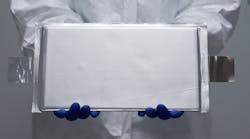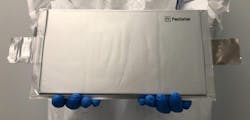Capacity Retention Milestone Achieved for 40-Ah Solid-State EV Battery
What you'll learn:
- Benefits of solid state vs. lithium ion.
- Overcoming the capacity issues with a solid-state battery.
- What is the FEST solid electrolyte?
For electric vehicles (EVs) to capture more than just 4% of global car sales, buyers need to see dramatic price and performance improvements in the underlying battery systems. Liquid electrolytes perform effectively over a wide temperature range (from below 0°C to about 100°C). But they pose disadvantages: high flammability, capacity loss, electrolytic decomposition at high voltages limiting the use of high-voltage cathode materials, thermal runaway, and risk of leakage.
Solid-state batteries don’t exhibit these drawbacks, allowing for higher operating temperatures due to better thermal stability. Thus, they’ve become an emerging option for next-generation EV traction batteries, Compared to EVs using conventional lithium-ion (Li-ion) batteries, those installed with solid-state batteries are expected to have a significantly higher range due to the high battery density.
A solid-state battery uses solid electrodes and a solid electrolyte, instead of the liquid or polymer gel electrolytes found in lithium-ion or lithium-polymer batteries. Solid-state batteries can theoretically store twice as much energy as that of Li-ion batteries. To date, however, developers of all solid-state batteries have struggled to scale up cell capacity.
Factorial Energy, headquartered in Woburn, Mass., announced capacity retention testing results of the company’s 40 amp-hour (Ah) solid-state cell technology. The company’s initial round of cell cycle behavior testing at 25°C demonstrated a 97.3% capacity retention rate after 675 cycles. These numbers are important because solid-state electrolytes are generally slow at transporting lithium ions—ionic diffusion in a solid tends to be orders of magnitude slower than ionic diffusion in a liquid. Therefore, batteries that cycle with adequate rate capability are hard to build.
A battery is judged on five metrics: how much energy it packs, how fast it charges, how many charge-discharge cycles it lasts, how safe it is, and how much it costs. Factorial says its solid-state battery technology can improve energy density, safety, charging rates, and costs over existing batteries.
Solid-State Battery FEST
The company’s Factorial Electrolyte System Technology (FEST) is a proprietary solid electrolyte material. It would be made with high-voltage and high-energy-density electrodes, meaning it works with a lithium-metal anode.
Unlike traditional Li-ion technology, FEST replaces the combustible liquid electrolyte with a safer, more stable solid-state electrolyte that suppresses lithium dendrite formation on lithium-metal anodes. Battery platforms based on FEST are claimed to yield 20% to 50% improvements in driving range without sacrificing pack longevity, and they surpass prevailing EV battery performance standards.
Factorial is said to be the first startup to reach the 40-Ah benchmark for a solid-state cell. According to the company, its drop-in battery technology can be easily integrated into the existing Li-ion battery manufacturing infrastructure.
“Factorial’s initial cycle testing behavior proves that our solid-state battery technology is in advanced stages of development, offers superior levels of performance, and is positioned to make a major impact on the battery market,” said Factorial Energy CEO Siyu Huang. “Scaling up cell capacity has been a major impediment for solid-state batteries, and we are thrilled that our proprietary technology has broken through this critical performance barrier.
“Factorial’s initial cycle testing behavior proves that our solid-state battery technology is in advanced stages of development. We’re working closely with our global leading strategic partnerships to bring the technology to the electric-vehicle market.”
The process, noted Huang, was practical, customer-driven, and electrode agnostic, and has yielded the world’s first commercial-scale, balanced performance-profile solid-state cell. “We are thrilled to be the first to reach the 40-Ah benchmark for a solid-state cell,” said Huang.
Behind the Scenes
Factorial Energy has invested heavily in solid-state battery research over the past six years. Factorial's total capital commitment to date exceeds $40 million, which will enable the company to scale commercial sampling over the next two years.
Earlier this year, Factorial Energy named Former Panasonic North America CEO Joe Taylor as Executive Chairman. Also added to Factorial’s advisory board were Dieter Zetsche, the former chairman of the Board of Management of Daimler AG and Head of Mercedes-Benz, Mark Fields, former Ford Motor Company CEO, and Harry Wilson, former senior advisor to the Obama Administration’s Presidential Task Force on the Auto Industry.
Several major global automotive partners are said by the company to be currently validating its technology with the intent of integrating FEST into their existing supply chains.
According to the new market research report "Solid-State Car Battery Market by Vehicle (Passenger Car and Commercial Vehicle),” published by MarketsandMarkets, the solid-state car battery market is projected to grow from 27,070 units in 2025 to 661,724 units by 2030, at a CAGR of 89.5%, The study cites factors such as increasing demand for EVs around the world, higher battery capacity and EV range using solid-state car batteries, and other features of solid-state batteries like higher battery life, higher energy density, and better safety features compared to presently used Li-ion batteries. The study revealed that a growing concern for larger-distance commuting using EVs also will boost the market.

